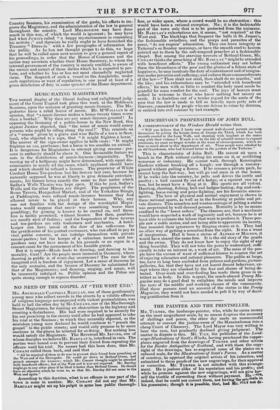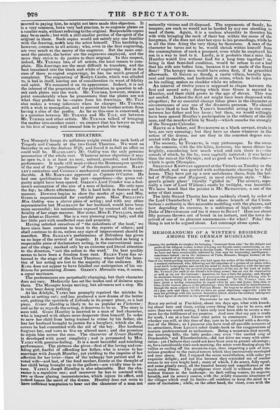THE PAINTER AND THE PRINTSELLER.
MR. TURNER, the landscape-painter, who, while he earns money on the most magnificent scale, by no means despises the economy of shillings and pence, the other day made an unsuccessful attempt to convert the justice-room of the Mansionhouse into a cheap Court of Chancery. The Lord Mayor was very willing to hear the case, but prudently declined giving judgment. The matter in dispute is this. Mr. TILT, the publisher of the Land- scapeIllustrations of Scotts Works, having purchased the copper- plates engraved from the drawings of TURNER and other artists for the Border Antiquities of Scotland, and with them the copy- right of the drawings, has re-engraved some of the plates on a reduced scale, for the Illustrations of Scott's Poems. As a matter of courtesy, he apprised the original artists of his intention, and submitted to them proofs of the new engravings, for their approval or correction. Mr. TURNER is not satisfied with this arrange- ment. He is jealous alike of his reputation and his profits; and while he protests against the new engravings, will not give hie"' self the trouble of correcting them without payment. He-_,-'erg. • indeed, that he could not correct them, not having the orisinalgiT his possession; though it is possible, that, had Mr.'11:1"
snuffed to paying him, he might not have made this objection. It is a very common, beta very bad practice, to re-engrave plates on a smaller scale, without referring to the original. Respectable copies may be so made ; but with a still smaller portion of the spirit of the original in them. Such copies would not satisfy any one familiar with the drawing, mitah less the artist himself. This hardship is, however, common to all artists; who, even in the first engraving, are very much at the mercy of the engraver. But the more emi- nent the painter, the better are the engravers employed, and the more they strive to do justice to their original. In this respect, indeed, Mr. TURNER has, of all artists, the least reason to com- plain. His drawings are the most difficult to translate, and the best translated into the black and white of engraving. But in the case of these re-copied engravings, he has too much ground of complaint. The engraving of Roslyn Castle, which was alluded to, is bad in itself, leaving out of consideration its want of fidelity and spirit. We censured it on its appearance. Indeed, it is not the interest of the proprietors of the publication in question to ad- mit such plates into the work. Mr. TURNER, however, strains a point considerably when he pronounces that the plates are not what they profess to be—copies from his drawings. Mr. TILT also makes a wrong inference when he charges Mr. TURNER with a wish to monopolize, and to prevent his brother artists from having a slice of the profits. As far as this case is concerned, it is a question between Mr. TURNER and Mr. TILT, not between Mr. TURNER and other artists. Mr. TURNER talked of bringing the matter into another court : we suspect that his lawyer as well as his love of money will counsel him to pocket the wrong.





















 Previous page
Previous page